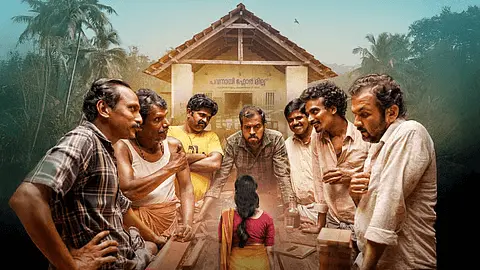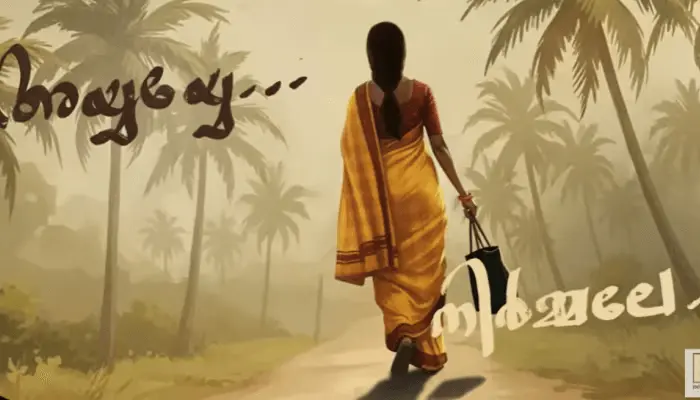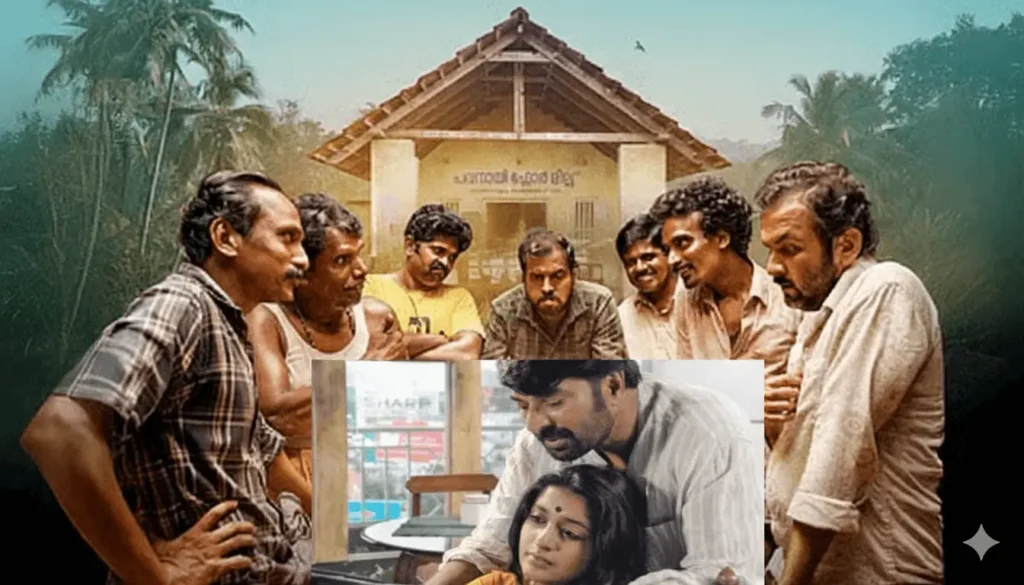Avihitham by Senna Hegde is a simple satirical film. Co-written with Ambareesh Kalathera. What makes it interesting is how it touches on female desire and infidelity, a theme that has often been explored in Malayalam cinema in very different ways. To understand this better, let’s look at how female desire is portrayed in Avihitham compared to Ore Kadal, a layered and emotionally complex film.
The movie opens with a striking quote: “They weigh us, they measure us, and then they decide our worth.” This line perfectly sums up the essence of the film.

A Scandal in the Dark: How Avihitham Unfolds
One night in Ravaneshwaram, Kasaragod district, the local loafer Prakashan (Ranji Kankol) spots two people secretly making out. From a distance, he recognises the man as Vinod (Vineeth Chakyar), who works at a flour mill.
He can’t see the woman’s face because of the darkness. Since the act happens near the house of Nirmala (Vrinda Menon), who lives there with her daughter and mother-in-law while her husband Mukundan (Rakesh Ushar), a carpenter, is away at work, Prakashan assumes she must be the woman.

What follows is an elaborate, supposedly foolproof plan by Prakashan and a group of men, including Nirmala’s husband and his family, to catch the lovers red-handed.
Avihitham’s treatment is similar to Senna’s previous flick Thinkalazhcha Nishchayam, but there, the climax hit hard, forcing us to introspect and empathise with the victims.
Here, due to weak writing and the absence of strong turning points, the audience may struggle to empathise with the secret lover or her choices. The flat narration and preachy, predictable dialogues at the end make it even weaker.
Characters That Speak Louder Than the Plot
Why someone enters an illicit affair is often reduced to a single reason — “the husband is not caring” — but I expected more nuance from a director like Senna Hegde.
That said, I liked how he wrote certain characters. For example, Tailor Venu concludes that the woman was Nirmala based purely on her body measurements, which he claims to calculate in darkness — cleverly echoing the opening line: “They weigh us, they measure us, and then they decide our worth.” Similarly, Prakashan’s voyeuristic pleasure and Mukundan’s blind trust in everyone except his wife add layers to the village dynamics. Senna builds the soul and core of Avihitham on a strong foundation, but the film loses its grip by the end.
Now, let me draw a parallel between Ore Kadal by Shyamaprasad and Avihitham. This might help explain why I find the climax of Avihitham more of a mockery than a solid, emotionally convincing moment.
(Read this only after watching Avihitham.)
The Climax That Missed Its Reflection
Senna Hegde is known for holding a mirror to small-town social structures with a dry, observational tone. But in this case, the way the film ends — with Geetha explaining her actions almost in a moral-preachy way — can feel like it’s trying to “justify” a personal choice that’s actually morally and socially complex.
Geetha is a housewife in Avihitham. She is married to Mahesh, a carpenter from a typical patriarchal community. He is a male chauvinist who believes women should obey and follow men. In their world, being expressive or caring is considered a sign of being “henpecked.” Geetha develops a love interest in Vinodh, a mill owner, and they begin meeting near the bathroom at night to have sex.
Director Senna Hegde justifies this relationship through Geetha’s dialogue in the climax, where she says Mahesh never cared about her feelings, never listened to her, and didn’t even allow her to watch her favourite TV serial. Vinodh, on the other hand, listened to her worries. In a preachy tone, the film ends with Geetha delivering a few lines explaining her actions — and then the story simply wraps up.
Why ‘Avihitham’ Climax Didn’t Work for Me
1. Patriarchal setup vs individual choice
Yes, Geetha’s husband Mahesh is portrayed as a classic patriarchal male, emotionally unavailable, controlling, and dismissive. That part is very real in many households.
But patriarchy doesn’t automatically justify infidelity.
What it explains is why she might feel suffocated, not why she must cheat.
The emotional neglect here sets the context, not the moral defence.
2. Emotional connection vs sexual escape
From what the film shows, Geetha’s relationship with Vinodh happens in secret, in a bathroom corner at night, repeatedly.
There’s no serious conversation between them on screen beyond her venting.
That clearly points to a physical and emotional outlet, but more heavily leaning on sexual release and escapism than a deep, emotionally meaningful connection.
So when the film suddenly ends with a “justifying” monologue, it feels like it’s trying to frame lust as liberation, which isn’t automatically valid or convincing.
3. Problem with preachy justification
A stronger script would have let the act speak for itself or shown its consequences, instead of Geetha explaining it in a moralising way.
When the movie uses her explanation as the final word, it:
- Silences other perspectives (e.g. the betrayal involved, Mahesh’s flaws notwithstanding).
- Flattens the complexity of such relationships into a “good vs bad” binary.
- Feels emotionally manipulative to the audience, telling us what to feel, instead of letting us decide.
The film clearly wanted to keep Geetha’s identity as the “surprise” element, which is probably why Senna avoided showing her perspective or building parallel emotional layers around her character.
But that choice comes at a cost, the climax ends up depending entirely on a preachy dialogue to justify her actions. If they didn’t want to reveal her directly, they could have still hinted at her emotional state through other female characters or parallel situations. That would have allowed the film to show the greyness of both characters and make the ending feel more earned and organic.
Orey Kadal’s Deepti vs Avihitham’s Geetha
Deepti’s Journey in Ore Kadal: Plot
Now let’s look at Ore Kadal, directed by Shyamaprasad and based on the Bengali novel Hirak Deepti by Sunil Gangopadhyay. Starring Mammootty as Nathan and Meera Jasmine as Deepti, the film explores how human desires and social realities often clash in messy, painful ways.

The story is about Deepti, a young housewife whose husband is struggling to make ends meet. Their life is full of financial stress and emotional distance. One day, she meets Nathan, an older social scientist who helps her during a tough moment. Slowly, their bond grows — but while Deepti starts to develop deep feelings, for Nathan it’s just a physical connection. This difference in how they see the relationship changes her life completely, pulling her into guilt, pain, and emotional turmoil.
This layered storytelling gives the film a quiet but powerful emotional weight, making it very convincing, even though Ore Kadal and Avihitham speak about similar themes in the end.

Avihitham vs Ore Kadal: A Question of Depth
1. Context vs depth
- In Avihitham, Geetha’s affair with Vinod happens quickly, physically, in secrecy, and the script tries to justify it in one dialogue, framing it as “Mahesh didn’t care about me, but Vinod listened.”
It simplifies a very complex human situation. - In Ore Kadal, Deepti’s relationship with Nathan is not just about physical desire. It begins with:
- Economic and emotional vulnerability,
- Intellectual awe,
- Gradual internal transformation.
She doesn’t enter the relationship out of rebellion but is slowly pulled into a web of emotions, class dynamics, and personal longing.
This depth makes a huge difference in how we perceive her choices.
2. Character motivation
- Geetha is reacting to her husband’s control and neglect. Her relationship is an escape, not an evolution.
It is more lust and rebellion than layered love. Even the movie doesn’t give us more than a shallow justification. - Deepti is a woman crushed by economic dependence, class inferiority, and intellectual loneliness.
Nathan represents everything missing in her life: intellect, security, attention, and a kind of forbidden freedom.
Even when the relationship is exploitative in a subtle way, her emotional investment is genuine.
This is why you may felt empathy for Deepti but not for Geetha.
3. Filmmaking choices
- Avihitham ends with a preachy justification, almost spoon-feeding the audience how to feel.
It takes a moral stand: “she was right to do this because her husband was wrong.” - Ore Kadal does the opposite: it does not justify or condemn.
It simply shows the consequences, love, guilt, loneliness, madness.
It treats Deepti as a human being, not a symbol for rebellion or morality.
This subtlety gives viewers the space to think and feel.
4. Lust vs longing
- In Avihitham, the relationship is framed around physical meetings in a corner at night. It never explores why she’s drawn to Vinod beyond “he listens.”
- In Ore Kadal, Deepti’s longing for Nathan is shown through:
- Her hesitation to meet him,
- Her emotional dependency,
- Her heartbreak when she realises he doesn’t love her.
This isn’t just sexual, it’s a deep emotional entanglement.
This is why Deepti’s actions feel more tragic than immoral.
5. Why is my reaction different
I instinctively felt Geetha’s act was just about desire and rebellion, because the film gave me no real emotional bridge to her decision.
But I felt Deepti’s act was understandable, even if not “right,” because the film made me walk through her inner world step by step.
That’s the power of layered writing.
- Avihitham: simplifies morality: “bad husband = justified affair.”
- Ore Kadal: complicates morality: “broken woman → human desire → guilt, collapse, pain.”
I felt like Senna Hegde tries to explain; but Shyama Prasad reflects.
And that’s why Ore Kadal lingers in your head long after it ends, whereas Avihitham might leave a feeling of imbalance or superficiality.
Final Thoughts: Avihitham vs Orey Kadal
Now, I do agree, you can’t compare apples and oranges. You can’t put a black humour satire next to a complex, layered feature film. Yet, the reason I’m making this comparison is because of what I witnessed in the theatre.
Many people were openly abusing Geetha’s character; some even shouted, “slap her!” That clearly shows whatever Senna Hegde was trying to communicate didn’t connect with a large part of the audience.
If the intention was to create a mirror for society, then the writing needed to be more serious and layered. And that’s exactly where Ore Kadal becomes a good example. Avihitham is still running in theatres, while Ore Kadal is available to watch on YouTube, and both offer two very different ways of handling the same sensitive theme.